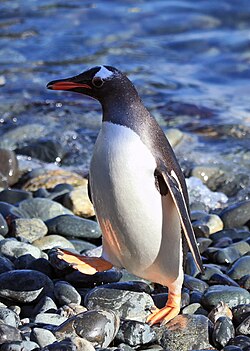Gentoo penguin
The gentoo penguin (Pygoscelis papua) is a species of penguin easily recognized by the white stripe across its head. They are the largest penguins of the stiff-tailed family, which also makes them the largest penguin except the two giant penguins, the emperor penguin and the king penguin.
| Gentoo penguin | |
|---|---|

| |
| Gentoo penguin | |
| Conservation status | |
| Scientific classification | |
| Kingdom: | |
| Phylum: | |
| Class: | |
| Order: | |
| Family: | |
| Genus: | |
| Binomial name | |
| Pygoscelis papua | |
Appearance
The gentoo penguin is, on average, 5 kilograms in weight and 80 centimeters in height, but can range from 8.5 kg to 4.5 kg and 51 to 91 cm. They have very large male reproductive organs, and are also the fastest at swimming underwater among the penguins, reaching speeds of 36 kilometers per hour.
Life
Gentoo penguins generally live on Antarctic islands, with their largest colony on the Falkland Islands. There are approximately 320,000 breeding pairs of gentoo penguins.
These penguins nest on the ground, making nests of stones, sticks, grass, feathers, and various other materials. They usually lay two eggs by mid-October, which hatch in about 34 days, and put equal care into caring for either chick. Young chicks remain in the nest for 3 to 4 weeks until their second down feathers grow in, during which their parents hunt for food in order to feed them. Afterward, they leave the nest but remain in the colony in groups of chicks, called creches that free their parents to hunt for food for them.
Gentoo penguin pairs often stay together for a long period of time.
Gentoo penguins usually eat crustaceans, such as krill, but genrally eat what is easiest to get. At sea, they may be under attack from sea lions, leopard seals, and orcas. While on land they have no natural predators, but skua, gulls, and other birds of prey have been known to attack and eat young chicks and eggs.
Gentoo Penguin Media
Falkland Islands Penguins 05
Gentoo Penguin Baby (24940372635)
A close-up of head on the West Falkland
Gentoo penguin Pygoscelis papua , egg, Coll. Museum Wiesbaden
A family on Wiencke Island, Palmer Archipelago, off the coast of the Antarctic Peninsula
Gentoo penguins in Antarctica, walking along a "penguin highway", a path that joins the sea and their nesting area on a rocky outcrop
Brown skua (Stercorarius antarcticus) attacking a gentoo chick at Godthul, South Georgia
Other websites
| Wikimedia Commons has media related to Lua error in Module:Commons_link at line 62: attempt to index field 'wikibase' (a nil value).. |
- Gentoo penguins from the International Penguin Conservation Web Site
- www.pinguins.info : information about all species of penguins
- Gentoo Penguin images
- Gentoo penguin webcam from the Antarctic – worldwide first webcam with wild penguins; photo quality
References
- ↑ Unknown assessors (2010). Pygoscelis papua. 2008 IUCN Red List of Threatened Species. IUCN 2008. Retrieved on 8 October 2011.



